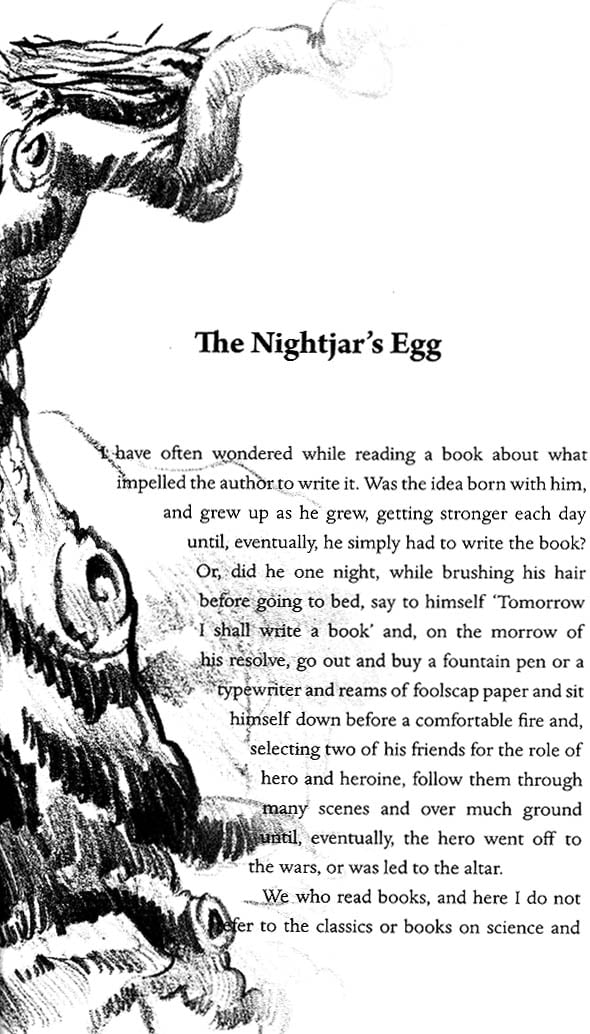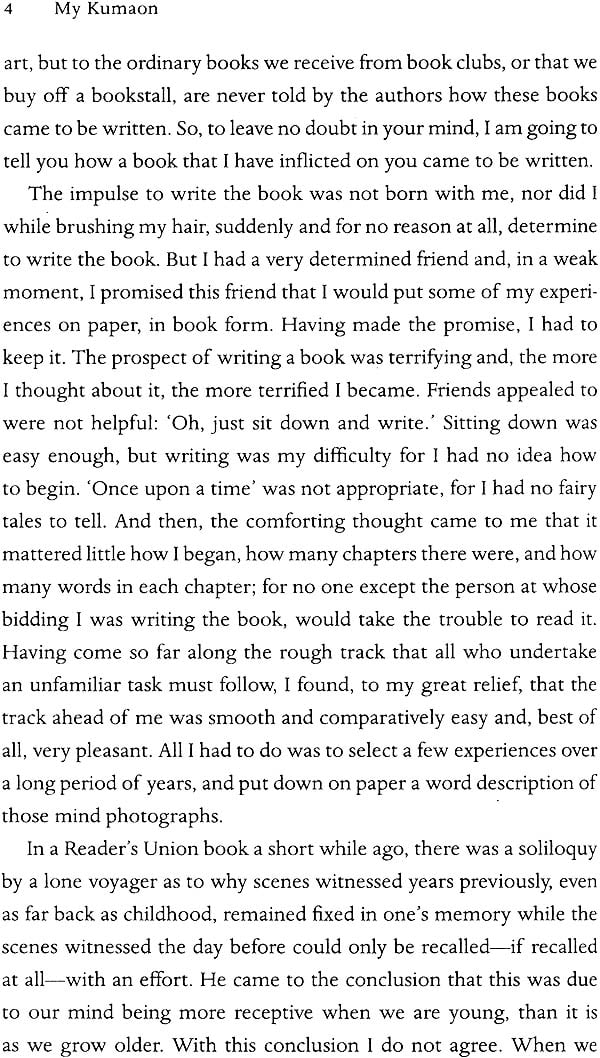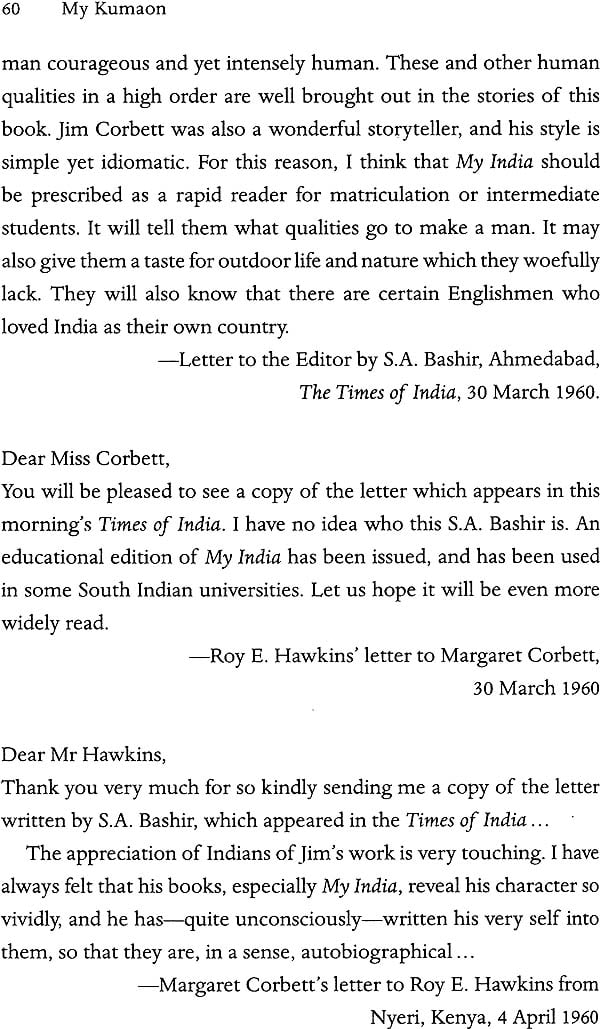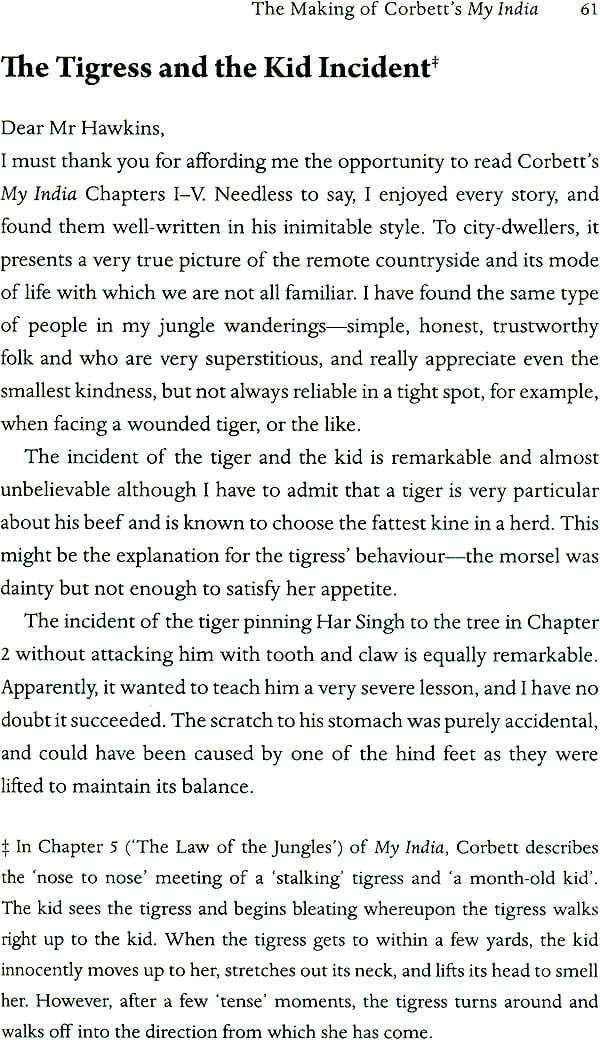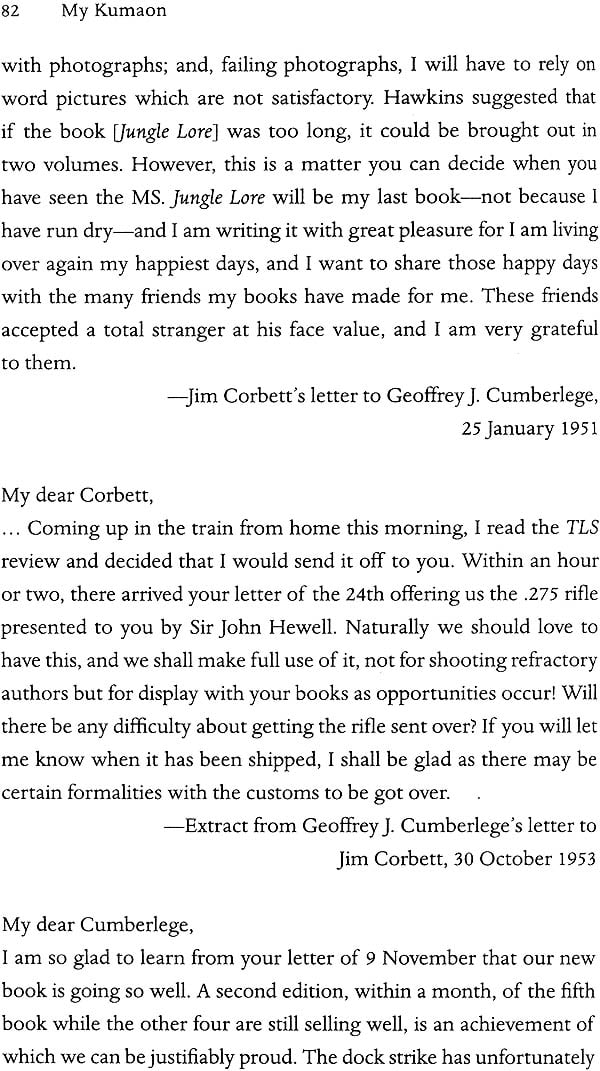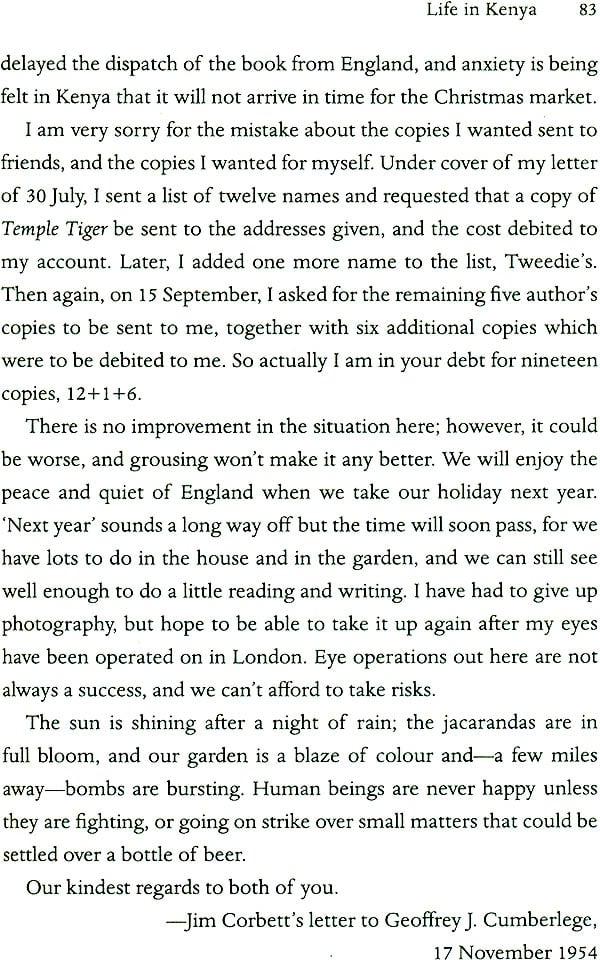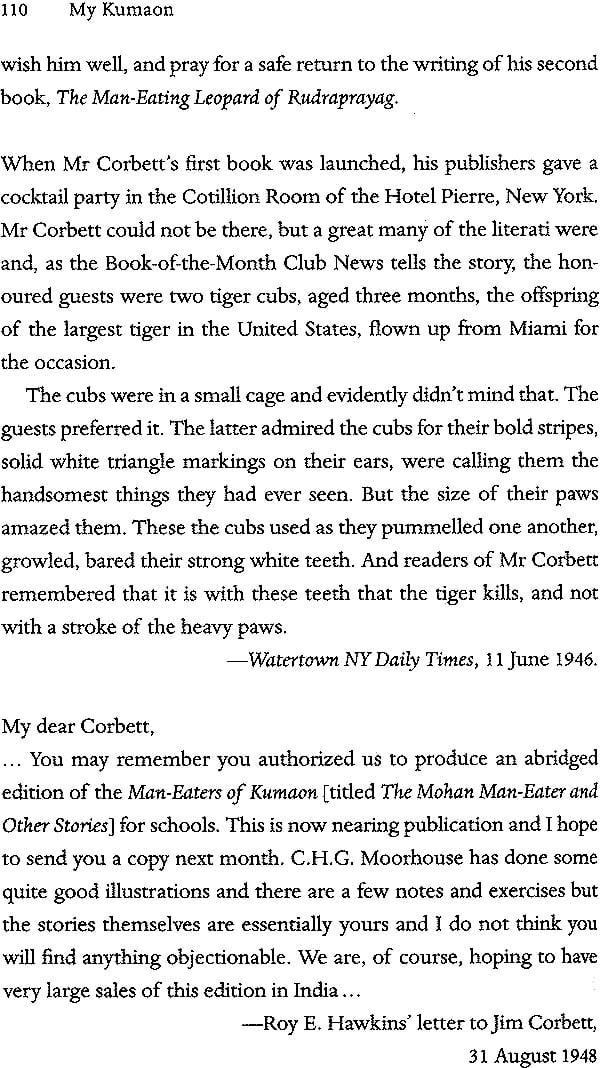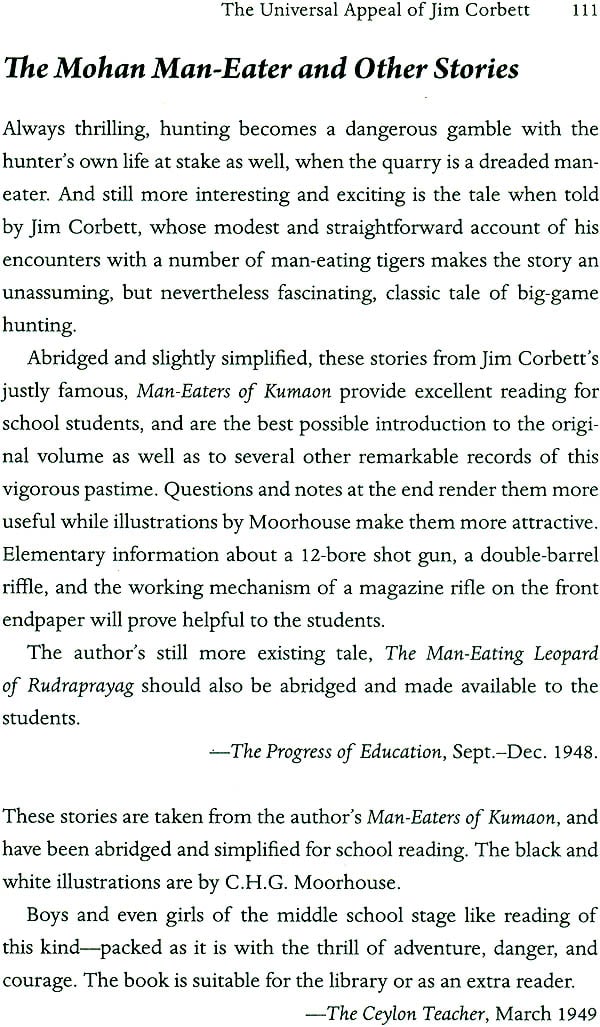
My Kumaon: Uncollected Writings of Jim Corbett
Book Specification
| Item Code: | NAF879 |
| Author: | Jim Corbett |
| Publisher: | Oxford University Press, New Delhi |
| Language: | English |
| Edition: | 2017 |
| ISBN: | 9780198082897 |
| Pages: | 162 (Throughout Color and B/W Illustrations) |
| Cover: | Paperback |
| Other Details | 8.5 inch X 5.5 inch |
| Weight | 180 gm |
Book Description
About the Book
This is vintage Jim Corbett from the Press archives: from writings on man-eaters, nature, and his beloved Kumaon, personal letters, and articles written for newspapers and gazettes by his contemporaries to letters exchanged between Corbett and his publisher showcasing the development of his bestselling books. Together they reflect Corbett's complete empathy with the people of Kumaon, his great understanding of wildlife, and his deep thinking on conservation and the need to protect the tiger and its future.
Including evocative line drawings and with a plate section devoted to rare archival photographs, this book will appeal to all admirers of Jim Corbett, the man and the writer.
About the Author
Jim Corbett was a pioneer in many respects- a hunter par excellence with over a dozen man-eaters (thought to have taken more than 1,500 lives) to his name and a committed conservationist who helped establish India's first national park (later named after him).
Corbett was also a consummate storyteller whose adventurous and perceptive tales have not only entertained and captivated a whole generation of readers, but also opened their eyes to the cause of the environment. His books-Man-Eaters of Kumaon (1944), The Man-Eating Leopard of Rudraprayag (1948), My India (1952),Jungle Lore (1953), The Temple Tiger and More Man-Eaters of Kumaon (1954), and Tree Tops (1955)-continue to remain bestsellers even today.
Publisher's Note
In 2012, Oxford University Press celebrates a hundred years of publishing in India. This is a time to look back as well as move forward. Over the years, the Press has nurtured close relationships with its authors, of which Jim Corbett is, perhaps, the best known. British hunter, naturalist, and a conservationist, Corbett is famous for slay- ing a large number of man-eating tigers and leopards in the Kumaon region of northern India. Frequently called upon by the government of the United Provinces during the 1920s and the 1930s, Corbett is known to have slain nineteen tigers and fourteen leopards. Some of these man-eaters were given names-such as the Champawat Tiger, the Leopard of Rudraprayag, the Tigers of Chowgarh, and the Panar Leopard-all of which have become the stuff of legend. His successes earned him both gratitude and fame, and the people of Kumaon often describe him as a saint. Corbett was encouraged to write about his hunting experiences by Roy E. Hawkins, manager of the Indian Branch of Oxford University Press, and a personal friend. Man-Eaters of Kumaon (1944), The Man-Eating Leopard of Rudraprayag (1948), My India (1952),jungle Lore (1953), The Temple Tiger and More Man-Eaters of Kumaon (1954), and Tree Tops (1955) have had commercial and popular success over the years, and continue to be bestsellers even today. In 1978, Roy E. Hawkins brought out a collection of unpublished stories by Corbett in a book titled jim Corbett's India. All these books-written in a racy style full of suspense and detail-are popular with children, naturalists, preservationists, and even hunters, and are in keeping with India's attempts to conserve its dwindling number of tigers.
OUP India's centenary has provided us with an opportunity to go back to the archives-both in India and in the UK-to search for the evolution both of Corbett's books and his relationship with the Press. During the search, we found letters, notes, reviews, and articles highlighting Corbett's engagement with the times in which he lived, his complete empathy with the people of Kumaon, and his great understanding of tigers. This volume presents Corbett's unpublished essays, personal diary entries, articles written for news- papers and gazettes by his contemporaries, and letters between Corbett and his editors (especially Roy E. Hawkins)-all culled from the archives of Oxford University Press. They showcase the man and his love for the people of Kumaon who accepted 'a total stranger at his face value', and where he spent his 'happiest days'.
As with all findings that go back fifty years and more, sources for some of the articles have been lost. Thus, while the name of the publication in which Lord Hailey's 'A Life Well Lived' first appeared remains untraced, the names of the authors of 'The Artlessness of his Art' and 'The Man Revealed: Corbett in his Writings' are also missing. However, since the material contained in them was so interesting, we have chosen to include them in this volume.
This addition to the Corbett corpus of titles is being brought out during our centenary year. Besides being a tribute to the author and the long-lasting value of our publishing, this title also commemorates the enduring relationship between the Press and Jim Corbett who has been one of its best-selling writers since Man-Eaters of Kumaon was first published in 1944.
Contents
| Photographs (between pp. 44 and 45) | vii |
| Publisher's Note | x |
| Jim Corbett: A Chronology | xv |
| 'How I Came to Write’ | xvii |
| A Life Well Lived: An Introduction to Jim Corbett by Lord Hailey | |
| Section One | |
| The Unpublished Corbett | |
| The Nightjar's Egg | 3 |
| 'One of Us' | 8 |
| From My Jungle Camp The Rudraprayag Letters | 21 |
| Corbett on The Man-Eating Leopard of Rudraprayag | 47 |
| The Making of Corbett's My India: | 50 |
| Correspondence with his Editors | |
| 'Shooting' Tigers: Corbett and the Camera | 66 |
| Wildlife in the Village: An Environmental Appeal | 69 |
| An Englishman in India | 74 |
| Life in Kenya | 78 |
| Section Two | |
| Corbett and His Audience | |
| 'The Artlessness of his Art' | 87 |
| The Man Revealed: Corbett in his Writings | 96 |
| The Universal Appeal of Jim Corbett: Letters and Reviews | 105 |
| Deliverance for Rudraprayag: Reactions to the Slaying | 125 |
| of the Man-eating Leopard by Corbett | |
| Corbett's Influence: Man-Eaters of Kumaon and the | 137 |
| Chhindwara Court Case | |
| Epigraph | 141 |
